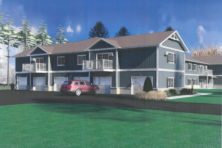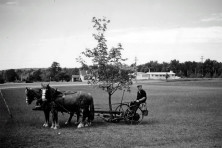Brookfield: 1955
- Share
- Tweet
- Pin
- Share
NON-FICTION
Editor’s Note: Barbara Kriegsmann submitted Brookfield: 1955 to this year’s Hal Grutzmacher’s Writers’ Expose. Non-fiction judge, Justin Isherwood, called the story “poetic, well and beautifully done, a hymn.” We are pleased to feature the piece as an Honorable Mention.
Pick up the previous issue of the Pulse – our annual Literary Issue – to read more fine prose and poetry, and to view the selection of photography honored in our annual Photography Jubilee.
“It isn’t given to us to know those rare moments when people are wide open and the lightest touch can wither or heal. A moment too late and we can never reach them anymore in this world.” ~ F. Scott Fitzgerald
Winter in the Upper Midwest buries memory. By January, the waves of tall Indian grass, the blazing stars and baby’s breath amidst the towering goldenrod, the green smell of earth, they’re all but forgotten. Gone are the lilacs heavy with fragrant blossoms, the deep red cherries on the tree beside the back porch. The rushing of the flooded Salt Creek, the sweetness and rhythm of birdsong, the hiss of locust, all are gone, replaced by a wind wailing as though it has always prevailed.
But at the time I lived there as a child, winter’s most impressive power was in the snow that smoothed and softened sharp edges, making lanes of the grid streets in our prairie town along the railroad line. It covered the coarse quarry stone that lined the alleys, blanketed the cinders beside the tracks, and its drifts and mounds billowed along the roadside.
Wintry evenings in my prairie neighborhood were never cold for me. It was not the bundling in wool-lined snowsuits, the triple winding of long scarves or thick mittens that wholly insulated. It was the snow itself. For it glistened, warmly reflecting the street lamps and the lights from the neighbor’s porches and parlors. The lighted windows seemed to be all that was left of the houses themselves, their outlines disappearing at this hour, so early yet so dark. And I think I’ve never been so warmed as when I crouched in a bank with my brother, our bodies sinking into snow cushions. With our breath surrounding us, I had the sense that we would always be able to keep each other safe.
After the first storm, snow became the geology of our block, as day after day, it fell and lay in strata of white sediment. The layers compacted with the passage of each brief day, compacted so densely that digging down through them felt, to the children doing the work of making their forts and missiles, like the excavation of a rock quarry.
The newest snow was soft as down; when we laid in it we could flap our arms, leaving the impression of perfect celestials. The layer just beneath made the snowballs we regarded as the weapons of good sport because they held their shape without the ice that could make them truly harmful. But that last deep layer was the one we mined for building blocks, the forts that would last through early March. And on the occasion when a bully emerged from the bunch of us, we knew we could use this deepest crystallized layer to retaliate, for its snow could be packed tightly, then more tightly, until the weapons we created had the quality of cannonballs.
Most frosty days we trooped from home to school, school to home and our encounters with neighbors were limited to the evening. It was then that my brother and I, along with the other children, would wait on the corner for the six-oh-five train that would bring our fathers home from the city. My mother stayed back with the baby, and we raced down the stairs with her stern warning to stay on the corner, no crossing the street.
The men spilled from train cars, indistinguishable in their long overcoats and fedoras as the plume from the diesel engine hung in the frigid air. We searched the throng, looking this way and that. Then the particular gait, the unmistakably familiar way a man secures his hat, these habits marked each one indubitably, and each child identified their own dad with a cheering welcome.
My brother and I vied for the first clue of our father. We knew just what to look for. The hat tipped back, always a bit askew, with that shock of black hair escaping, the coat flung open wide so that he seemed not so much to descend the steps as to sail from the train car with panels of heavy camel wool flapping around him. But his suit was still carefully buttoned and his pants held their crease like a knife-edge. He was to us the handsome one, the lively one, among serious gray men who seemed to move slowly.
One or the other of us would shriek with victorious recognition as he bounded toward us, his smile so broad we could see his back teeth. And with that first sighting of him, the competition over our father faded. We were too giddy for him to swoop us up as he always did, scooping us, one then the other, beneath each of his arms, swinging us with our feet just off the ground until we squealed.
His ruddy face brushed against my cheek and felt rough with whiskers. I breathed him in. He still smelled of the morning, of the milky bottle with the sailing ship and of the parting splash he would pat on my cheek as I watched him finish his shave. By evening, though, there were other traces of the day apart from us: tobacco smoke clinging to his coat, perspiration, and the remnants of mingling with other commuters and office workers. The pleasure of that jumble multiplied as I nuzzled deeper into the space between his chin and chest.
The fathers took over command of our Red Flyers, and the meeting of the many sleds’ steel runners against the crust of snow –‘shh shh’– and bare patches on the sidewalk –‘kersh kersh’– formed the rhythm of our short way home.
Our father would race the fastest of them all, and we would pitch and hurtle through the night, expectant as puppies for their feeding. I’d close my eyes, swearing to keep them so, until we’d hit a bump. Then my bottom would rise up from the slats of the sled, and my eyes would snap open to a borealis of color. It was the sheerest joy, and I could not be blamed in those moments for thinking that nothing in this world could make me afraid.
Dinner could not be hurried enough. For winter circumscribed the world for everyone, most of all reducing it for the children. For my brother and me, winter shrank our lives to the size of our kitchen table where we did our homework, feeling the warmth of the oven, and narrowed experience to our bedroom where we whispered into the night. Spring snake collections, the spray of summer hoses, and autumn adventures in empty lots were forgotten. Our pickup games became mere imaginings of past times.
So it was no wonder we gathered our scarves and mitts and caps at the first chance that our parents’ would allow it. Then we wheedled our return to the white world, oblivious of the demands snowfall made upon our fathers. For their work was our passport to a wider world, the snow city of our neighborhood.
Because after a long day’s work, the fathers in our families had to carve through the fresh snow with shovels and plows until the paths and streets became taller and taller tunnels that seemed like permanent constructions. All the while, the newest layer, so downy and feathery, sparkled. Even in deepest February, this corner of Illinois twilight was suffused with radiance.
For the streetlights shone brightly in these evenings, long past our bedtime. We would learn years later that these beacons were extinguished long before midnight. But at that time, we only knew the reality of our smallest awareness, the snow and its ten-foot high hills which the plows left behind in the playground. As we belly flopped down these slopes in snowsuits, we never dreamed of a world where these lights would ever go out.
The fathers stopped their work occasionally to pummel their children with a flurry of snowballs, the soft kind, as they carefully avoided the deeper snow, dense with ice crystals. There were squeals then as we desperately tried to build up arsenals to return their attacks. Pelted by their flurries, we were breathless and high on our fathers’ attentions, unaware of the cold or wet of our exchanges of snowballs with them.
Then I saw my own father step forward with the perfect pitch aimed right for me. And time stopped until that soft wet ball landed on my cheek. I tasted it while the snow melted down my neck, relishing the cold that brought me so much excitement and could not really freeze me.
For winter didn’t simply bury the seasons of colorful memory. It created a new landscape and yielded to different transport, one on runners and blades instead of wheels. Winter gave us that snow, glorious snow that was our means of building yet another world, one of forts and tunnels, burrows and warrens.
During this time, these months, we knew nothing but snow. Forgotten during the wintertime were crabapple blossoms or any baseball games. For my brother and for me, it was as if the world always was, and always would be gloriously white.
Barbara Kriegsmann is a resident of Washington Island. She and her husband Greg are grateful to enjoy the gifts of such a beautiful place and the wonderful friends and neighbors who are a part of their life there.


